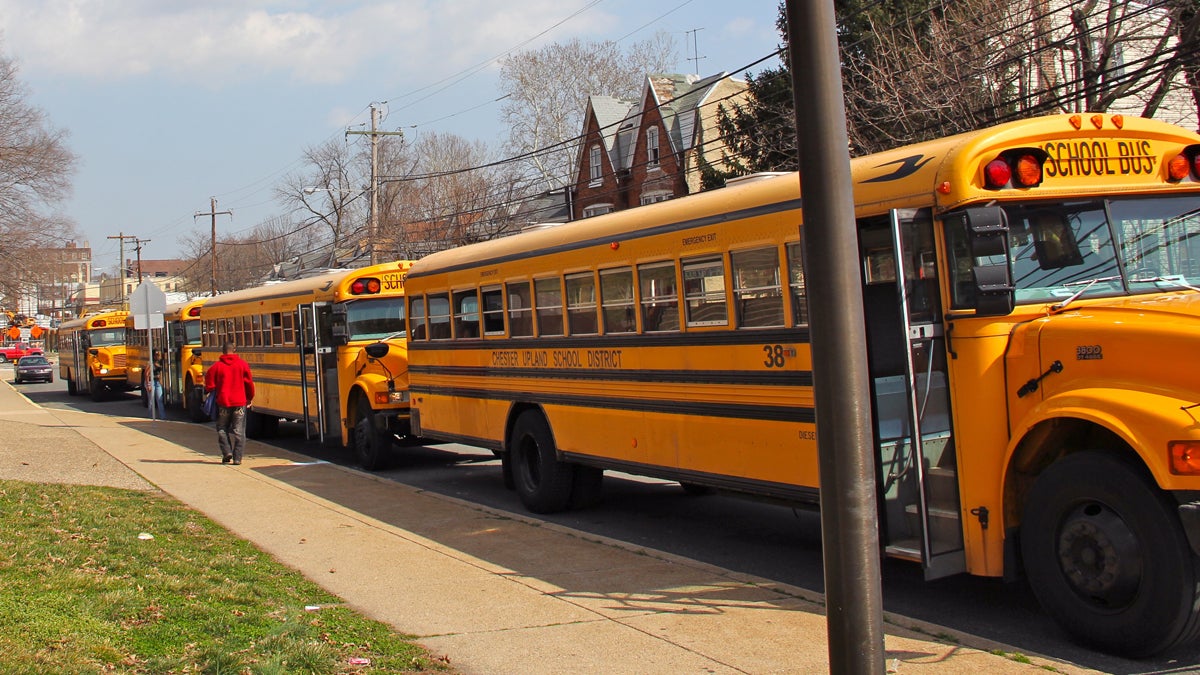Judge approves charter cut, more funds for Chester schools. But can he do that?
Listen
Buses await dismissal on West Ninth Street in front of Chester High School. (Emma Lee/for NewsWorks)
After two months of negotiations and hearings, Delaware County Judge Chad Kenney has approved a drastic plan to rework the Chester Upland School District’s finances.
The next question is, can he do that?
Chester Upland, one of a handful of financially distressed districts in Pennsylvania, has a state-appointed receiver in charge of charting a course for the district that will pull it out of a cycle of debts and deficits.
In August, receiver Francis V. Barnes introduced a plan that included cutting charter tuition payments for special education students from $40,000 a student to $16,000, the amount set by a bipartisan committee on special education funding.
After a series of rejections and revisions, the district struck a deal with the three largest brick-and-mortar charters to reduce that amount to $27,028 per student. Kenney approved a plan with that provision, and he ordered the state to cough up an additional $20 million in basic education funding, the line item that makes up the bulk of yearly state contributions to school districts.
As part of the order, charter schools must also waive payments they are still owed by Chester Upland, incurred during the 2014-2015 school year, a total of about $8.7 million lost.
Reducing charter costs was the main tenet of the state’s original plan, and could be construed as a victory for the Gov. Tom Wolf.
“We are reviewing Judge Kenney’s order, but we are pleased that the court has ordered a significant reduction in the special education charter rate,” said Jeff Sheridan, a spokesman for Wolf, in a prepared statement.
Charter operators, particularly those who were not privy to the deal setting the $27,028 figure, are less pleased.
Lawyer Brian Leinhauser represents four charters, all cyber, that serve a total of about 100 students in the district. Since the judge’s rule was released Friday, he said he had only spoken with one of his clients, but that an appeal had already been on the table.
“My clients do have concerns about the statewide implications of this decision, but they have not decided whether or not they have the desire or the resources to go forward with an appeal of that magnitude,” he said.
An appeal from either side is possible, said Leinhauser. At stake is whether the judge has the jurisdiction to cut charter payments, which are set by the Legislature, and whether he can impel the state to send more dollars to Chester.
Kenney said repeatedly in hearings — and in his ruling — that the formula which funds most public schools in Pennsylvania is inadequate in Chester, and demanded that the state beef up its contribution.
To issue his rule, Kenney had to decide which law takes precedence: Act 141, which grants the state somewhat undefined special powers in financially distressed districts, and the laws that govern how charter schools are paid.
Charter schools lawyers argued in Kenney’s court that school funding is a political, not judicial, question and they could appeal his decision to Commonwealth Court on that ground.
Also implied in the ruling is that Wolf will be able to secure a $20 million increase for Chester Upland’s funding, an uphill battle given the current state budget stalemate.
It’s that stalemate that Chester teachers and students now feel in the classroom, said special education teacher Dariah Jackson. Without state dollars flowing, Chester can save money on charter payments but new funding is still limited.
“It’s just the little things, not being able to buy basic needs for the classroom,” she said. “Field trips, right now we really can’t plan because we don’t have any money for buses.”
Without a budget, a spokeswoman said Chester Upland will run out of money at the end of November.
WHYY is your source for fact-based, in-depth journalism and information. As a nonprofit organization, we rely on financial support from readers like you. Please give today.




